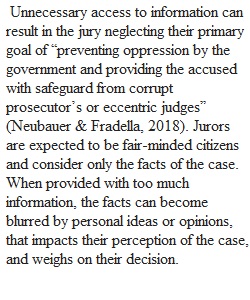


Q Each state has adopted a variety of rules regarding what facts are deemed proper evidence. Only what a court deems admissible evidence may be considered in reaching a verdict of guilt or innocence. Evidence that is suppressed because it was gathered in violation of the Constitution may have a profound impact on the guilt of a defendant. However, the ability to limit what information a juror has access to is becoming increasingly more difficult to control. The prevalence of smartphones and tablets allows jurors to gather data about a defendant, victim, crime scene, or witness that was not authorized or even presented at trial or in fact was specifically prohibited by law to be used to determine guilt. But, the temptation to know "the truth" can drive jurors to ignore the mandates of the Constitution and the laws governing proper evidence. • If the goal for a trial is the search for justice, evaluate why there are rules that limit a juror’s access to information? • Should guilt or innocence only use information gathered in compliance with the Constitution and approved by the judge? • What happens if there are no rules? • Should there be exceptions, and if so, are exceptions still a decision in the hands of the judge or can individual jurors make up their own rules about what is useful information to decide guilt or punish? • Review the Discussion Grading Rubric. Be sure you provide the scriptural, constitutional, and scholarly basis for your positions. Please review the Discussion Assignment Instructions Download Discussion Assignment Instructionsprior to posting. You may also click the three dots in the upper corner to Show Rubric. Post-First: This course utilizes the Post-First feature in all Discussions. This means you will only be able to read and interact with your classmates’ threads after you have submitted your thread in response to the provided prompt. Submit your thread by 11:59 p.m. (ET) on Thursday of Module 6: Week 6.
View Related Questions